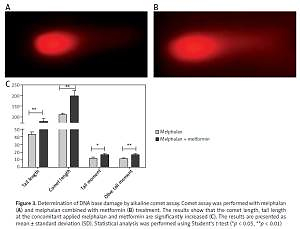Current issue
Archive
Manuscripts accepted
About the Journal
Editorial office
Editorial board
Section Editors
Abstracting and indexing
Subscription
Contact
Ethical standards and procedures
Most read articles
Instructions for authors
Article Processing Charge (APC)
Regulations of paying article processing charge (APC)
HEMATOLOGY / BASIC RESEARCH
The mechanism of treatment of multiple myeloma
with metformin by way of metabolism
1
Department of Hematology, Zhongnan Hospital of Wuhan University, Wuhan, China
2
Department of Urology, Zhongnan Hospital of Wuhan University, Wuhan, China
Submission date: 2019-01-05
Final revision date: 2019-03-07
Acceptance date: 2019-03-18
Online publication date: 2020-11-29
Publication date: 2021-07-16
Arch Med Sci 2021;17(4):1056-1063
KEYWORDS
TOPICS
ABSTRACT
Introduction:
Multiple myeloma (MM) is a malignant hematologic tumor. Although many new drugs are currently found to significantly improve the median survival, MM is still not curable due partly to drug resistance recurrence. Epidemiological studies have shown that patients with type 2 diabetes have a high risk of malignancy, and patients’ treatment with metformin could reduce the risk of cancer as well as associated mortality.
Material and methods:
We used chemotherapeutics – melphalan combined with metformin or the single drug – to treat RPMI8226 cells and used a series of tests to detect the drug sensitivity, apoptotic rate, DNA damage and the concentration of ATP. SPSS 17.0 was used to analyze the data.
Results:
The inhibitory effect of melphalan on RPMI8226 cells was significantly increased after metformin was added (p < 0.05), and the inhibitory effect was enhanced with the increasing concentration of melphalan. The comet assay showed that metformin increased melphalan-induced DNA damage and increased the apoptotic rate from 12.7 ±2.8% to 18.8 ±1.5% (p < 0.05). In the ATP concentration test, the concentration of ATP in the tumor cells was significantly decreased from 0.42 ±0.01 µmol/l to 0.08 ±0.02 µmol/l (p < 0.05).
Conclusions:
Metformin can promote DNA damage induced by melphalan and decrease the concentration of ATP in the process of repairing DNA damage to hinder the anti-apoptotic process of tumor cells, which showed the pesticide effect of the enhanced sensitivity of multiple myeloma cells to melphalan.
Multiple myeloma (MM) is a malignant hematologic tumor. Although many new drugs are currently found to significantly improve the median survival, MM is still not curable due partly to drug resistance recurrence. Epidemiological studies have shown that patients with type 2 diabetes have a high risk of malignancy, and patients’ treatment with metformin could reduce the risk of cancer as well as associated mortality.
Material and methods:
We used chemotherapeutics – melphalan combined with metformin or the single drug – to treat RPMI8226 cells and used a series of tests to detect the drug sensitivity, apoptotic rate, DNA damage and the concentration of ATP. SPSS 17.0 was used to analyze the data.
Results:
The inhibitory effect of melphalan on RPMI8226 cells was significantly increased after metformin was added (p < 0.05), and the inhibitory effect was enhanced with the increasing concentration of melphalan. The comet assay showed that metformin increased melphalan-induced DNA damage and increased the apoptotic rate from 12.7 ±2.8% to 18.8 ±1.5% (p < 0.05). In the ATP concentration test, the concentration of ATP in the tumor cells was significantly decreased from 0.42 ±0.01 µmol/l to 0.08 ±0.02 µmol/l (p < 0.05).
Conclusions:
Metformin can promote DNA damage induced by melphalan and decrease the concentration of ATP in the process of repairing DNA damage to hinder the anti-apoptotic process of tumor cells, which showed the pesticide effect of the enhanced sensitivity of multiple myeloma cells to melphalan.
We process personal data collected when visiting the website. The function of obtaining information about users and their behavior is carried out by voluntarily entered information in forms and saving cookies in end devices. Data, including cookies, are used to provide services, improve the user experience and to analyze the traffic in accordance with the Privacy policy. Data are also collected and processed by Google Analytics tool (more).
You can change cookies settings in your browser. Restricted use of cookies in the browser configuration may affect some functionalities of the website.
You can change cookies settings in your browser. Restricted use of cookies in the browser configuration may affect some functionalities of the website.



